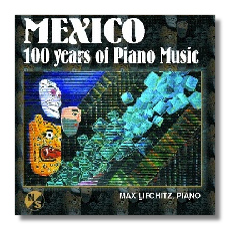
The Internet's Premier Classical Music Source
Related Links
- Latest Reviews
- More Reviews
-
By Composer
-
Collections
DVD & Blu-ray
Books
Concert Reviews
Articles/Interviews
Software
Audio
Search Amazon
Recommended Links
Site News
 CD Review
CD Review
Mexico: 100 Years of Piano Music

Ethnicity, Romanticism and Innovation
- Ricardo Castro Herrera:
- Nocturno for Piano
- Vals bluette
- Suite for Piano
- Manuel Ponce:
- Momento doloroso
- Prelude and Fugue for Piano left hand
- Carlos Chavez:
- …de rosa en rosa…
- Adelita y La cucaracha
- Sonatina for Piano
- José P. Moncayo García: Pieces for Piano
- E. Hernández Moncada: Costeña
- Blas Galindo Dimas: Jaliscience
- Rodolfo Halffter: Laberinto
- Marta Garcia-Renart: Tres momentos
- Manuel Enriquez: Maxienia
- Mario Lavista: Simurg
Max Lifchitz, piano
North/South Recordings N/SR1010 - 74min
Not all that surprisingly, the development of modern Mexican nationalist music has followed the route of Spain, beginning with Chopin grafted to native melodies, moving through a "French" Impressionistic phase, and finally developing a modern voice in which native elements become distanced and "objectified," not unlike the Russian elements in Stravinsky. Of course, the presence of Chavez and Revueltas, geniuses largely self-taught, didn't hurt.
Unfortunately, the music chosen for the program mostly bounces between the charming and quite forgettable and the file-cabinet gray "international" contemporary style of Enriquez and Lavista. One could put together a nice disc just on music by Chavez, Moncayo, and Halffter, or, for that matter, just by Chavez. At least here, the impressionist "… de rosa en rosa…" and "Adelita" would allow a listener to see where Chavez came from. Here, they get lost among the bon-bons and the drones of High Seriousness.
Lifchitz treats every piece well, despite an occasional tendency to overpedal (some of the fast runs wash out), but I consider his programming error just about unrecoverable. The one work that really grabs the listener immediately is Chavez's Sonatina, a piece that, despite its brevity, becomes monumental in effect. The danger here is that the pianist will force things, that every passage stays at the same loud dynamic, but Lifchitz knows to vary the line and to keep the counterpoint clearly heard.
The sound is acceptable.
Copyright © 1996, Steve Schwartz












